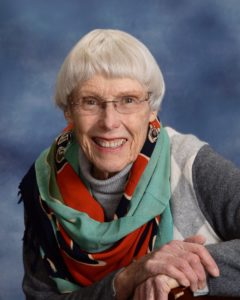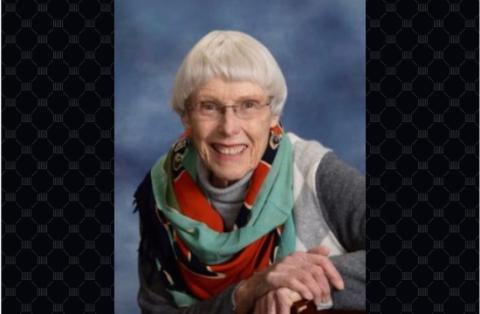
Jill Raitt (1931-2025)
We are saddened to share that Jill Raitt died on May 27, 2025. She was 94. Raitt founded the Department of Religious Studies at the University of Missouri. She was also a founding member of the UC-Riverside Department of Religious Studies, the first woman to win tenure at Duke’s Divinity School, and the second woman to be elected president of the American Academy of Religion. She will be remembered for her extraordinary intelligence, administrative skill, mentoring, commitment to collegiality, and generosity.
Raitt grew up in Eagle Rock, California and began her undergraduate education at Radcliff College, studying Latin and English. After studying with the Society of Jesus in Rome, she transferred to San Francisco College for Women, completing a degree in philosophy in 1953. She joined the Society of the Sacred Heart that same year and spent the next eleven years in cloister. She left the order in 1964 and enrolled at Marquette University, completing her Masters in medieval and reformation theology in 1965. She went on to become one of the first Catholics to earn a doctorate from the University of Chicago’s Divinity School with a dissertation titled “The Conversion of the Elements in Reformed Eucharistic Theology with Special Reference to Theodore Beza.” During the 1970s and 1980s she was one of two women to participate in a Lutheran-Catholic reconciliation dialogue. At Duke, she donated her faculty office to start the Divinity School’s Women’s Center. Raitt is honored annually at Duke University through the Jill Raitt Lecture Series, hosted by the Women’s Center at the Duke Divinity School.
Raitt’s brilliance and tenacity shaped her successes. She was an accomplished scholar, trailblazer, and dedicated mentor. She often told the story of being recruited to Duke from UC-Riverside. A search committee member asked if she was a feminist. “No,” she replied, “I study the Reformation.” Upon hearing this, they offered her a position. At Duke, she became a feminist because of her students’ advocacy for themselves and the behavior of her male colleagues. Following her difficult tenure battle, Raitt was elected president of the American Academy of Religion, and then took a position at the University of Missouri in 1981 to found the Department of Religious Studies, where she taught until retiring in 2000. After retiring, Raitt continued to teach and mentor, to publish, to win grants, and to help the Department grow and flourish. In 2002, Raitt won a $1,400,000 grant from The Pew Charitable Trusts to establish the Center for Religion, the Professions, and the Public, which was established as a Pew Charitable Trusts Center of Excellence in the spring of 2003. She directed the center during the first few years of its existence.
Since retirement, Raitt maintained an active research agenda and taught and worked closely with students until 2018. She was the Sisters of St. Joseph of Carondelet Endowed Chair in Catholic Thought at Fontbonne University from 2008 to 2011, a Visiting Professor at St. Louis University in the Department of Theology in 2012, and returned to teach in the Department of Religious Studies at the University of Missouri as a Visiting Professor in 2013. In 2016-17 she was a National Endowment for the Humanities Residential Fellow at the Center for Medieval and Renaissance Studies at St. Louis University to support her book project on Jesuit spiritual direction of women.
At the University of Missouri, Raitt insisted on placing Eastern, Western, and Indigenous religions on an equal footing from the beginning, making certain that the Department’s inaugural hires equally reflected the world’s religions. As she said at the time, “three-fourths of the world’s people have religions without a book.” Her insistence on ensuring non-scriptural religions was and is important as religions traditionally classified as “major” continue to dominate the field. Raitt had a clear vision for her Department’s structure and purpose and worked collaboratively with the founding members to better understand the methods and organizing principles of their discipline while they created a coherent curriculum.
In 1983, Raitt was awarded a $100,000 grant from the National Endowment for the Humanities to organize weekly seminars and hire consultants to lay the groundwork for their task. Of this work, Raitt said “the meetings were collegial. We welcome different points of view… there is creative tension.’’ Their meetings culminated in the Department’s curriculum and the report A Study of the Organizing Principles and Methods of the Discipline of Religious Studies, which was shared across the country in the 1980s, influencing the direction of many other Religious Studies programs. Noteworthy, especially for the era, was Raitt’s insistence on including at faculty meetings everyone teaching courses in the Department, including part-time instructors, and her genuine interest in hearing their opinions. She also fostered a culture of hospitality and encouragement of department social events for both faculty and students.
She was a caring mentor for incoming junior faculty, advising them and supporting them in their academic development. Many scholars who started their careers in teaching and research at MU’s Religious Studies Department owe her an enormous debt of gratitude. Since many of them moved on to positions at other colleges and universities, the mentoring role model that she established continues to benefit young scholars in the discipline far beyond Missouri.
Raitt is the author of numerous books and articles, including: The Eucharistic Theology of Theodore Beza: Development of the Reformed Doctrine (1972); Shapers of Religious Traditions in Germany, Switzerland, and Poland, 1560-1600 (1981); Other Worlds: An Introduction to Religion (1986); The Colloquy of Montbéliard: Religion and Politics in the Sixteenth Century (1993); and several edited volumes and references, including Christian Spirituality: High Middle Ages and Reformation (1987), co-edited with Bernard McGinn and John Meyendorff. Raitt continued to present her work at national and international academic conferences and to publish, edit, and peer review manuscripts until 2021. She was close to completing a book manuscript on the spiritual direction of women in Early Modern Europe, which she set aside during the COVID-19 pandemic. Sadly, she was unable to complete and publish this final book.
Raitt significantly contributed to achieving a more equal status for women in academia. When Religious Studies moved to a new building in 2021, we discovered an old file belonging to Jill Rait labeled “deserving of tenure” in her elegant cursive. The file contained correspondence with dozens of women from the U.S. and Canada who were fighting tenure denials in the 1980s and 1990s for whom she wrote letters of support and offered guidance. When the file was returned to her, she was surprised she had left it at the University for several decades and stated unequivocally that making time to support these women, many of whom she would never meet personally, was the easiest decision she could make because she knew that they had all deserved tenure.
Raitt volunteered weekly at Boone Hospital and had previously volunteered teaching refugees through the Catholic Charities of Central and Northern Missouri’s Refugee and Immigration Services. She cared deeply for animals and raised many dogs and horses.
Her funeral will be held August 9 at 10 a.m., with a visitation August 8, 4-8 p.m., both at the St. Thomas More Newman Parish, 602 Turner Ave, Columbia MO 65201. Gifts in her memory can be made to the J. Raitt Opportunities for Excellence in Religious Studies at mizzou.us/JRaittMemorialGifts.
